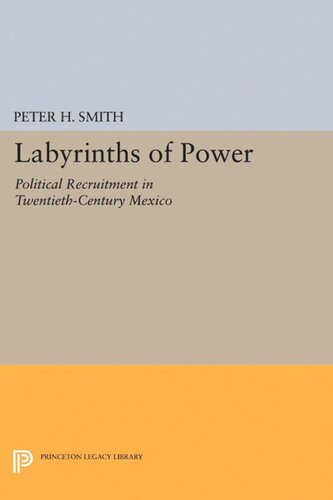

Most ebook files are in PDF format, so you can easily read them using various software such as Foxit Reader or directly on the Google Chrome browser.
Some ebook files are released by publishers in other formats such as .awz, .mobi, .epub, .fb2, etc. You may need to install specific software to read these formats on mobile/PC, such as Calibre.
Please read the tutorial at this link: https://ebookbell.com/faq
We offer FREE conversion to the popular formats you request; however, this may take some time. Therefore, right after payment, please email us, and we will try to provide the service as quickly as possible.
For some exceptional file formats or broken links (if any), please refrain from opening any disputes. Instead, email us first, and we will try to assist within a maximum of 6 hours.
EbookBell Team

4.4
82 reviewsPeter Smith has written a comprehensive and in-depth study of the structure and more important of the transformation of the national political elite in twentieth-century Mexico. In doing so, he analyzes the long-run impact of the Mexican Revolution of 1910 on the composition of the country's ruling elite. Included in his focus are such issues as the social basis of politics, the recruitments process, political career patterns, the amount of periodic turnover, and the relationships between the political and economic elites.
The author explores these issues through an empirical, computer-assisted investigation of biographical information on more than 6,000 individuals who held national political office in Mexico at any time between 1900 and 1976. He then employs various comparative and statistical techniques, along with a use of archival data, questionnaires, and interviews, to determine precisely how Mexico’s political system actually works.
Professor Smith finds that the Revolution of 1910 did not fundamentally alter the class composition of the national elite, although it did redistribute power within it. He further observes that the Mexican Revolution did bring about a separation of political and economic elites, and that the route to political success is much more varied and less predictable now than before the revolutionary period.
Originally published in 1979.
The Princeton Legacy Library uses the latest print-on-demand technology to again make available previously out-of-print books from the distinguished backlist of Princeton University Press. These editions preserve the original texts of these important books while presenting them in durable paperback and hardcover editions. The goal of the Princeton Legacy Library is to vastly increase access to the rich scholarly heritage found in the thousands of books published by Princeton University Press since its founding in 1905.